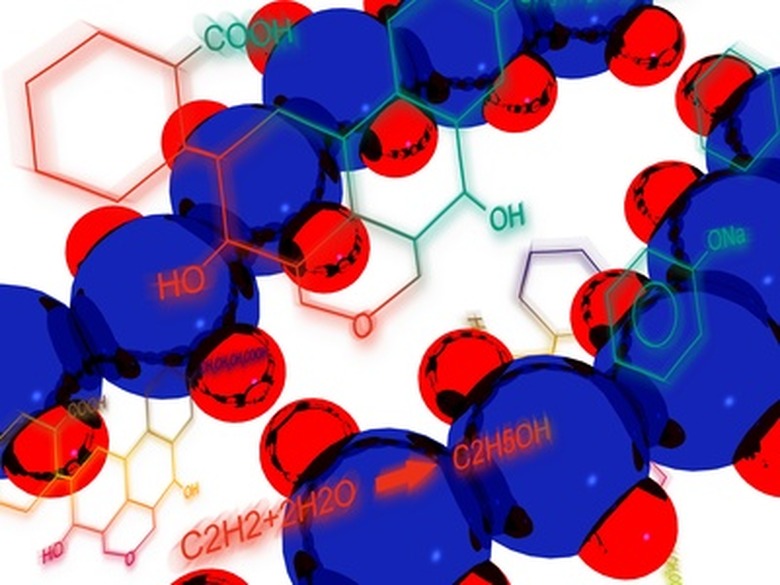Where Does Transcription Occur In A Eukaryotic Cell?
The two-step process of turning life's instruction manual (DNA) into actual moving pieces starts in the nucleus of a eukaryotic cell with transcription.
TL;DR (Too Long; Didn't Read)
Transcription occurs in the nucleus of a eukaryotic cell.
In this step, an enzyme called RNA polymerase reads a gene, or segment of DNA, that codes for a particular protein. It does this by unzipping the DNA helix into two strands and making an exact but opposite copy of the gene found there.
For every A, T, G and C the RNA polymerase sees, it adds the complementary base pair to a new molecule called messenger RNA (mRNA) – with one exception: instead of thymine (T) being the complement to adenine (A), mRNA contains the base uracil (U).
You can think of mRNA as the foreman at a construction site who directs her team. During transcription, she is getting the directions. In translation, the second step of the process, she is reading the directions to her team, which follows them and builds a protein that can do a specific job in the cell.
TL;DR (Too Long; Didn't Read)
The difference between transcription and translation is the difference between reading a gene and following the instructions on it to build a protein.
The process of transcription is happening all the time in every cell of your body. A single strand of mRNA can be used over an over to make the same protein multiple times.
Three Steps of Transcription
Three Steps of Transcription
Transcription occurs in three distinct phases: initiation, elongation and termination.
During initiation, the RNA polymerase finds the specific part of the DNA that it going to read. This part of the sequence is known as the promoter region. Frequently, the promoter includes a bunch of T and A bases in a row. Biologists have aptly named this the TATA box.
In the elongation phase, DNA unwinds continually ahead of the growing mRNA strand and is rewound behind it. The RNA polymerase acts as a stabilizer to keep all the molecules in place at the open segment of DNA.
Termination ends the process of transcription. This occurs when the RNA polymerase encounters a signal in either the DNA sequence or in the RNA that is being transcribed, telling it the whole gene has been read.
Where Does Translation Take Place?
Where Does Translation Take Place?
After transcription, the mRNA travels to the ribosome, a structure in the cytoplasm that constructs proteins. The ribosome reads the mRNA in chunks of three base pairs at a time. These triplets of letters, known as codons, each code for one of 20 different amino acids. The sequence AUG tells the ribosome to start building, while three different codons can tell it when to stop.
As the amino acids are strung together, chemical interactions along the molecule allow it to fold up into the unique 3-D shape of the protein.
Where Does Transcription Occur in Prokaryotes
Where Does Transcription Occur in Prokaryotes
Unlike eukaryotic cells, prokaryotic cells do not have a membrane-bound nucleus. In these cells, transcription occurs in the cytoplasm. Because transcription is already occurring in the same location where translation occurs, in prokaryotes both stages of building a protein can occur simultaneously.
In other words, as the RNA polymerase is reading the instructions from the DNA, the ribosome in the prokaryotic cytoplasm is following them.
This is not possible in eukaryotic cells, where the mRNA instructions first have to be transported out of the nuclear membrane and processed – cleaned up – a little bit before the ribosome can read them. This involves removing sections of the mRNA that do not code for anything, called introns, and stitching back together the remaining regions, called exons.
Additionally, in eukaryotes, two more types of RNA are used along the way to building proteins. Inside the ribosome, transfer RNA (tRNA) reads the mRNA, then selects and places the correct amino acids in order. Ribosomal RNA (rRNA) is another type of complementary strand that makes up much of the structure of the ribosome and also latches onto the incoming mRNA and helps to line up pieces in the assembly.
Cite This Article
MLA
Dusto, Amy. "Where Does Transcription Occur In A Eukaryotic Cell?" sciencing.com, https://www.sciencing.com/transcription-occur-eukaryotic-cell-7287203/. 19 June 2019.
APA
Dusto, Amy. (2019, June 19). Where Does Transcription Occur In A Eukaryotic Cell?. sciencing.com. Retrieved from https://www.sciencing.com/transcription-occur-eukaryotic-cell-7287203/
Chicago
Dusto, Amy. Where Does Transcription Occur In A Eukaryotic Cell? last modified March 24, 2022. https://www.sciencing.com/transcription-occur-eukaryotic-cell-7287203/
